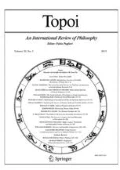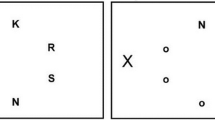Abstract
In this paper, I explore the implications of recent empirical research on concept representation for the philosophical enterprise of conceptual analysis. I argue that conceptual analysis, as it is commonly practiced, is committed to certain assumptions about the nature of our intuitive categorization judgments. I then try to show how these assumptions clash with contemporary accounts of concept representation in cognitive psychology. After entertaining an objection to my argument, I close by considering ways in which conceptual analysis might be altered to accord better with the empirical work.
Similar content being viewed by others
References
Armstrong, S. L., Gleitman, L. R., and Gleitman, H.: 1983, ‘What some concepts might not be’,Cognition 13, 263–308.
Achinstein, P.: 1968,The Concepts of Science, Johns Hopkins University Press, Baltimore, Maryland.
Barsolou, L.: 1983, ‘Ad-hoc categories’,Memory and Cognition 10, 82–93.
Barsolou, L.: 1985, ‘Ideals, central tendency, and frequency of instantiation’,Journal of Experimental Psychology: Learning, Memory, and Cognition 11, 629–654.
Barsolou, L.: 1987, ‘The instability of graded structure: implications for the nature of concepts’, inConcepts and Conceptual Development: Ecological and Intellectual Factors in Categorization, U. Neisser (ed.), Cambridge University Press, Cambridge.
Brown, H.: 1988,Rationality, Routledge, London.
Carnap, R.: 1950,Logical Foundations of Probability, University of Chicago Press, Chicago.
Cherniak, C.: 1984, ‘Prototypicality and deductive reasoning’,Journal of Verbal Learning and Verbal Behavior 23, 625–642.
Chomsky, N.: 1965,Aspects of the Theory of Syntax, MIT Press, Cambridge, MA.
Chomsky, N.: 1972,Language and Mind, Harcourt, Brace and Jovanovich, New York.
Cornman, J. W., Lehrer, K., and Pappas, G. S.: 1982,Philosophical Problems and Arguments: An Introduction (3rd Ed.), Macmillan, New York.
Fodor, J.: 1987,Psychosemantics, Bradford/MIT Press, Cambridge, MA.
Hampton, J. A.: 1981, ‘An investigation of the nature of abstract concepts’,Memory and Cognition 9, 149–156.
Horgan, T.: 1990, ‘Psychologistic semantics, robust vagueness, and the philosophy of language’, inMeanings and Prototypes: Studies in Linguistic Categorization, Routledge, London, 535–557.
Kripke, S.: 1972,Naming and Necessity, Harvard University Press, Cambridge, MA.
Lakoff, G.: 1987,Women, Fire and Dangerous Things, University of Chicago Press, Chicago, IL.
Malt, B. C. and Smith, E. E.: 1982, ‘The role of familiarity in determining typicality’,Memory and Cognition 10, 69–75.
McCloskey, M. and Glucksberg, S.: 1978, ‘Natural categories: Well-defined or fuzzy sets?’,Memory and Cognition 6, 462–472.
Medin, D. L. and Smith, E. E.: 1984, ‘Concepts and concept formation’,Annual Review of Psychology 35, 113–138.
Putnam, H.: 1962, ‘The analytic and the synthetic’, inMinnesota Studies in Philosophy of Science, Vol. III, H. Feigl and G. Maxwell (eds.), University of Minnesota Press, Minneapolis, MN, pp. 350–397.
Putnam, H.: 1975, ‘The meaning of “meaning”’, inMind, Language and Reality: Philosophical Papers, Vol. II, Cambridge University Press, Cambridge, 215–271.
Rey, G.: 1983, ‘Concepts and stereotypes’,Cognition 15, 237–262.
Rey, G.: 1985, ‘Concepts and conceptions: A reply to Smith, Medin and Rips’,Cognition 19, 297–303.
Rips, L. J., Shoben, E. J., and Smith, E. E.: 1973, ‘Semantic distance and the verification of semantic relations’,Journal of Verbal Learning and Verbal Behavior 12, 1–20.
Rips, L. J.: 1975, ‘Inductive judgments about natural categories’,Journal of Verbal Learning and Verbal Behavior 12, 1–20.
Rosch, E.: 1973, ‘On the internal structure of perceptual and semantic categories’, inCognitive Development and the Acquisition of Language, T. E. Moore (ed.), Academic Press, New York.
Rosch, E.: 1975, ‘Cognitive representation of semantic categories’,Journal of Experimental Psychology: General 104, 192–233.
Rosch, E.: 1978, ‘Principles of categorization’, inCognition and Categorization, E. Rosch and B. Lloyd (eds.), Lawrence Erlbaum Hillsdale, New Jersey, pp. 27–48.
Rosch, E. and Mervis, C.: 1975, ‘Family resemblances: studies in the internal structure of categories’,Cognitive Psychology 8, 382–439.
Rosch, E., Simpson, C., and Miller, R. S.: 1976, ‘Structural bases of typicality effects’,Journal of Experimental Psychology: Human Perception and Performance 2, 491–502.
Roth, E. M., Shoben, E. J.: 1983, ‘The effect of context on the structure of categories’,Cognitive Psychology 15, 346–378.
Rumelhart, D., Smolensky, P., McClelland, J. and Hinton, G.: 1986 ‘Schemata and sequential thought processes in PDP models’, inParallel Distributed Processing, Vol. II, MIT/Bradford, Cambridge, MA, pp. 7–57.
Smart, J. J. C.: 1965, ‘The methods of ethics and the methods of science’,Journal of Philosophy 62, 344–349.
Smart, J. J. C.: 1990, ‘Integrity and squeamishness’, inUtilitarianism and its Critics, J. Glover (ed.), Macmillan, New York, pp. 170–174.
Smith, E. A.: 1990, ‘Categorization’, inThinking: An Invitation to Cognitive Science, Vol. III, D. Osherson and E. Smith (eds.), MIT, Cambridge, MA, pp. 33–53.
Smith, E. A. and Medin, D. L.: 1981,Categories and Concepts, Harvard University Press, Cambridge, MA.
Smolensky, P.: 1988, ‘On the proper treatment of connectionism’,The Behavioral and Brain Sciences 11, 1–74.
Stich, S. P.: 1990,The Fragmentation of Reason, Bradford/MIT Press, Cambridge, MA.
Stich, S. P.: (forthcoming), ‘What is a theory of mental representation?’.
Tversky, A. and Gati, I.: 1978, ‘Studies of similarity’, inCognition and Categorization, E. Rosch and B. Lloyd (eds.), Lawrence Erlbaum Associates, Hillsdale, N. J.
White, A. R.: 1975, ‘Conceptual analysis’, inThe Owl of Minerva, C. J. Botempo and S. J. Odell (eds.), McGraw-Hill, New York.
Williams, B.: 1970, ‘The self and the future’,Philosophical Review LXXIX, 161–180.
Wittgenstein, L.: 1953,Philosophical Investigations, Macmillan, New York.
Author information
Authors and Affiliations
Additional information
Thanks are due to John Bickle, Marian David, Terence Horgan, Stephen Stich, John Tienson, Paul Weithman and an anonymous referee for several helpful comments and suggestions. Earlier versions of this paper were presented at Central Michigan University, The University of Memphis, The University of Mississipi and The Second International Conference on Cognitive Science at San Sebastian, Spain. A great deal of useful feedback was provided by these audiences.
Rights and permissions
About this article
Cite this article
Ramsey, W. Prototypes and conceptual analysis. Topoi 11, 59–70 (1992). https://doi.org/10.1007/BF00768299
Issue Date:
DOI: https://doi.org/10.1007/BF00768299




